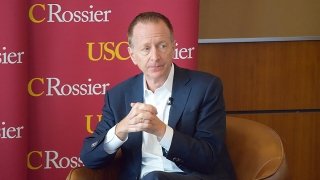Superintendents are more educated than ever before. But as challenges in education grow and demands of the job intensify, experience has become increasingly valuable.
Janice Jackson, Austin Beutner and Richard Carranza are former superintendents from Chicago, Los Angeles and New York, respectively, three of the nation’s largest school districts. Here is what they say about how superintendents can draw insight from their unique professional experience. (Read their full interviews in USC Rossier Magazine.)
Janice Jackson, on being a woman in a leadership role:
When I talk to women leaders, the one thing I always tell them is lead like a woman.
I remember early on in my career, you’d get these lead like a man or think like a man rally speeches which made no sense to me because it didn't [account for] a lot of natural attributes that women have that I do think make for good leadership, like listening, or the passion [for] some of the family and social and emotional issues … Those aren't bad things but I think sometimes we're taught that they are … There are certain natural attributes, whether you're a man or a woman that you must bring to the table when you're leading. But there are some things that are more innate to women that are valuable and [we] should lean into [those].
Austin Beutner, on why his experience outside of education is useful (Beutner worked in finance, served as the deputy mayor of Los Angeles and was the CEO and publisher of the Los Angeles Times before becoming superintendent).
If there's a constancy throughout my life journey, [it’s that] I enjoy solving problems. I'm not afraid to ask questions or bring in, whether it's myself or others, [someone] with a fresh set of eyes to look at solving a problem ...
My life experience caused me to be an avid questioner of the status quo … to understand how did we get to where we are, and to see [if] there are things we can change for the better … If you listen, if you bring in people who have life experience in [a] particular field of endeavor and give them agency to ask the questions and to challenge the status quo along with you, I think you set yourself up for a recipe for success.
Richard Carranza, on the value of being an ‘outsider’ as the leader of a school district (Carranza was born in Arizona and his career has spanned across Houston, San Francisco and New York City).
The advantage that I think I’ve had as an outsider is … it's allowed me to very much be able to diagnose … challenges, and perhaps bring a solution that I know would work because I've seen it work elsewhere.
I think another advantage is that you have to prove yourself … [When I start in a district, the community wants to know if my actions align with] what I say I’m going to do. And for somebody that's an insider, they don't necessarily have to go through that period, but I've found that [to be] a really, really exciting time [in which I] get to know the community … To go out into the stadiums, have community meetings, have a listen and learning tour and then publish what I've learned and what I've heard, [that is] very beneficial as well.
Janice Jackson, on leading the district in which she attended school and grew up.
I know the district inside and out and there have been examples of that being extremely helpful. For example, during union negotiations sometimes there are things that come up that are a little wacky. Because I've been a teacher or principal, [I can say] that's not a real issue, [and I have] more credibility and believability ...
But the other part of that is also acknowledging the areas where there are true problems that have been problems for decades and have gone unanswered or haven't been fixed fast enough … In order to [ensure] you're staying focused and continuing to do the work, you also have to take into consideration that you can only do so much. And you're gonna have to be very strategic about what you take on and when you take it on.




